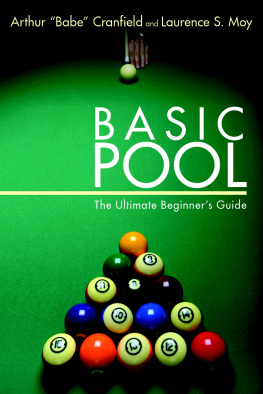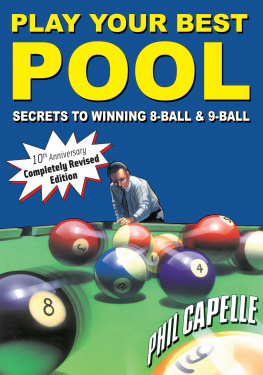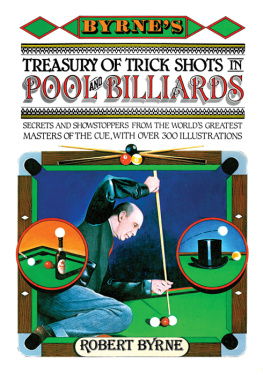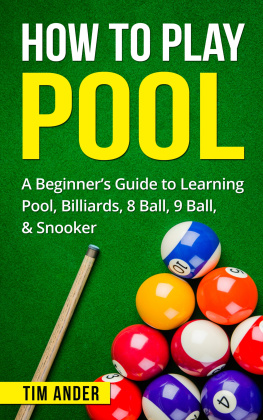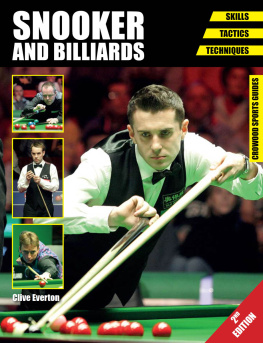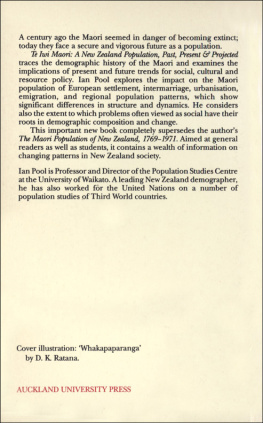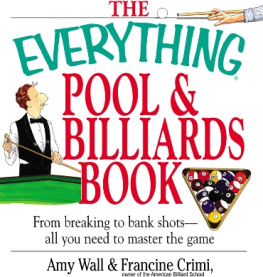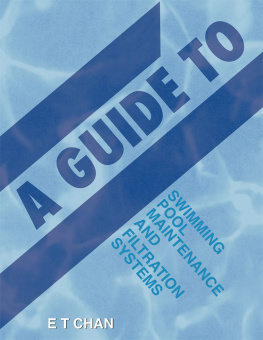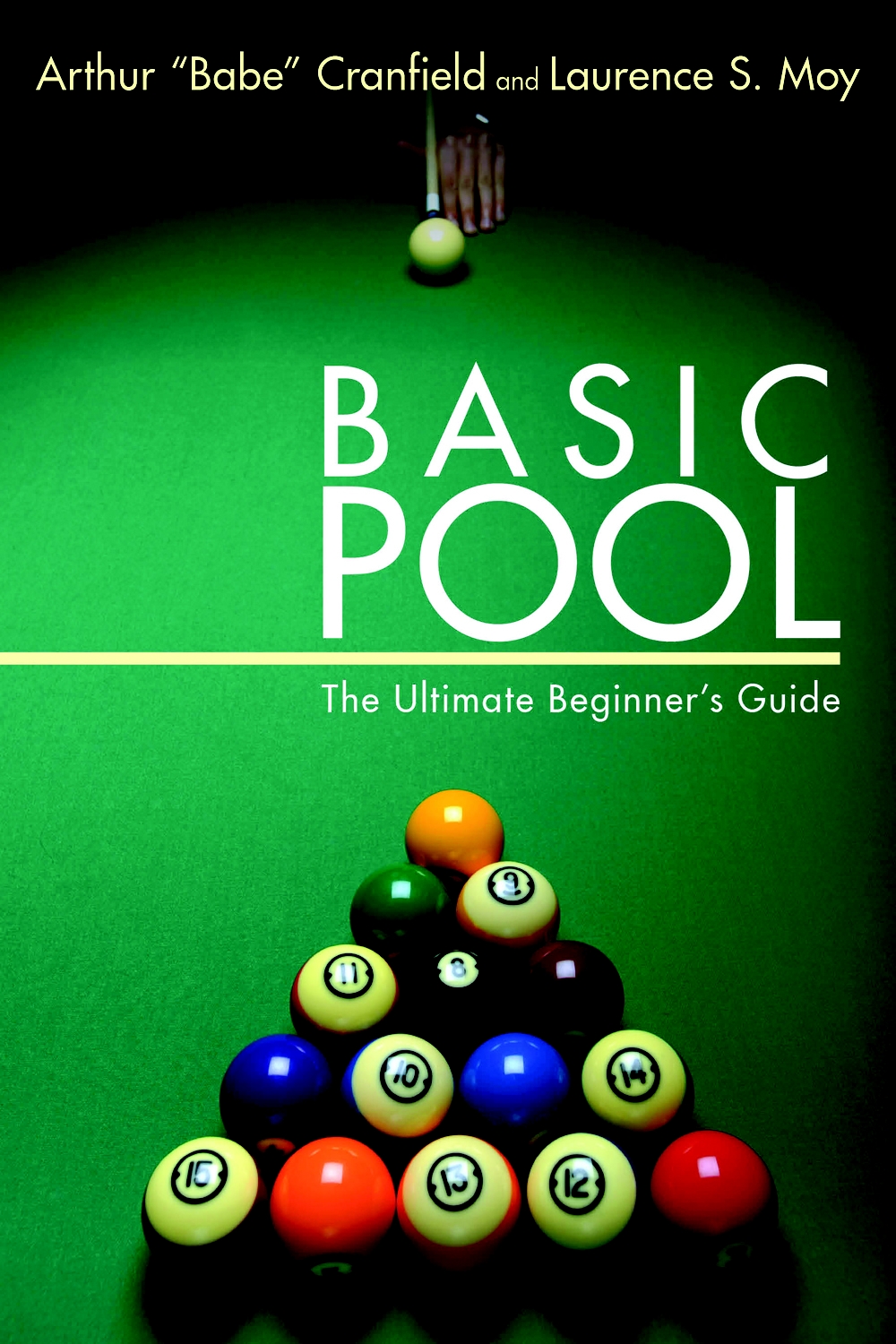Arthur Babe Cranfield
Born on September 24, 1915, to Arthur Sr. and Isabel Cranfield, Babe lived, at various times, in the New York City borough of the Bronx; Hudson, New York, where his family operated a farm; and Syracuse, New York, where he lives today.
During much of Babes childhood, his father owned and ran a poolroom, although its locale changed as Babes family moved from place to place. Thus, Babe was exposed to billiards from an early age and could practice for free, advantages that combined with his natural gifts to produce an unusual talent. By the time he was 12, Babe could run 100 balls at straight pool. He also excelled as a youth in many other sports, including basketball, tennis, baseball, bowling, and golf, in which he captured a number of titles, for a while considering golf as a career.
In the 1930s Babe attended Cornell University in Ithaca, New York, intending to study agricultural techniques to benefit his familys farm. His time at college was cut short, however, when he accepted an offer to tour the country performing billiards exhibitions promoted by Sylvester Livingston, who managed tours for most of the prominent billiards stars of that era.
Babe enjoyed the distinction of being the only billiards player in history to have won the premier titles at every available level of play. In addition to many others, Babe won the United States Junior Championship when he was 15 years old; the U.S. Amateur Championship three consecutive times (in 1938, 1939, and 1940); and the Worlds Professional Championship in 1964. He captured the Worlds Professional title in a challenge match over the thenworld title holder, Luther Lassiter. Contested in a multi-day block format, Babe prevailed by a final score of 1,200 to 730.
In recognition of his achievements, on July 19, 1997, the Billiard Congress of America inducted Babe into its Hall of Fame. Babe is also a member of the Syracuse Sports Hall of Fame.
Outside of pool, Babe made his mark by serving in the air force during World War II, and, later, joining Background Music, Inc., a major distributor for Muzak, after short stints in other jobs. Babe advanced to the position of vice president of sales within that company, where his career ultimately spanned 40 years.
In December 1940, Babe married Ruth Fish. Together they raised two sons, Lawrence and Gary, and had four grandchildren, Zachary, John, David, and Kelly. He passed away in 2004.
Laurence S. Moy
Born in 1960 in Plainfield, New Jersey, to Jack and Mary Moy, Larry grew up with his sister, Taryn, in Astoria Queens (New York), and later in Rockland County, New York. Larry first saw pocket billiards played in a poolroom next door to his parents Chinese restaurant in Nanuet, New York. He remembers marveling at how the players he watched could somehow make the cue ball move from one end of the table to the other for position on their next shot. Larry did not start playing regularly until 1978, when he was 18 years old. That same year, he began attending Cornell University in Ithaca, where he first saw Babe Cranfield perform an exhibition.
At Cornell, Larry won the university championship and other titles numerous times. Perhaps his biggest achievement, however, was graduating with a bachelors degree in four years (a feat many of the dedicated pool players on campus took somewhat longer to accomplish). In 1982 Larry began law school, also at Cornell, not touching a cue once in his first year of legal study but returning to the game to win the ACU-I intercollegiate title in 1985 for the region covering New York and Canada. (Although this win qualified Larry to compete in the national ACU-I tournament, no such tournament was held in 1985 due to lack of a sponsor.)
Larry now lives with his wife, Karen, and two children, Christopher and Hannah, near New York City, where he is a partner with the law firm of Liddle & Robinson, L.L.P., specializing in litigation and employment law. In addition to pool, Larry has maintained a strong interest in music (having played piano and guitar from an early age), basketball, and racquet sports (tennis, squash, and table tennis).
The highlight of Larrys pool life was being invited by the Billiard Congress of America to make the presentation for induction of Babe Cranfield into the BCA Hall of Fame in July 1997.
CHAPTER 1
Getting Started
A s with any other demanding game, your rewards in pool will increase as you improve. As you become more accomplished, the game has an uncanny way of revealing its possibilities and nuances. In pool, perfect execution is not enough. You must be constantly striving to gain knowledge, and you must develop the ability to create solutions to problems that you have never seen before. All of this can make the game seem overwhelmingly daunting and difficult. Those same qualities, however, make pool interesting at all levels of play. There will always be new ways for you to develop as a pool player. The game is rich in its intricacy, variety, and challenges; it is a true lifetime endeavor, impossible to outgrow.
Today, pool is being played in a wide variety of settings: in poolroom leagues, in team competitions, in bar leagues, in weekend tournaments, in clubs, in homes, and in commercial poolrooms. No matter which of these settings you prefer, if you want to improve at pool, you will need to find a placeand the timeto practice on your own. You will never get much better at pool if you only play games and never practice, since you will be depriving yourself of the chance to experiment with different approaches. Once you reach a certain level, it will become absolutely necessary for you to compete against others, in addition to practicing alone, in order to continue to improve. In an ideal world, you would have the time and the money to practice on your own, play against other players, and receive personal instruction.
Even if this is not possible, you can become accomplished at pool if you are willing to practice it seriously as a sport. Take the approach of trying to absorb every bit of information that comes your way during your practice sessions and games. Most of what you learn through both practice and competition is picked up through observation.
Becoming proficient at pool also means recognizing that you can, and should, learn from virtually everyoneeven players whom you usually beat. Players who are generally weaker than you may still be superior at some aspect of the game. Dont be so proud that you cheat yourself out of an opportunity to gain more knowledge. By learning how to address more and more situations on the table, you will be building what I call your pool vocabulary. Increasing this vocabulary will help you every time you step up to the table.

